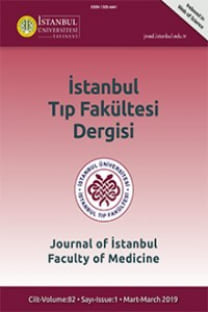KLİNİK PRATİKTE KAPSAMLI GERİATRİK DEĞERLENDİRME: HASTALAR NE DÜŞÜNÜYOR?
Kapsamlı geriatrik değerlendirme, memnuniyet, geriatrik sendrom, faydalanım
COMPREHENSIVE GERIATRIC ASSESSMENT IN PRACTICE: WHAT DO PATIENTS SAY?
___
- 1. Türkiye İstatistik Kurumu Haber Bülteni. İstatistiklerle Yaşlılar 2019. 2020:33712. Available from https://data.tuik. gov.tr/Bulten/Index?p=Istatistiklerle-Yaslilar-2019-33712
- 2. Solomon DH. Geriatric assessment: methods for clinical decision making. JAMA 1988;259(16):2450-2. [CrossRef]
- 3. Beers MH, Berkow R. Comprehensive geriatric assessment. The Merck Manual of Geri- atrics. 3rd ed. Whitehouse Station: Merck Research Laboratories 2000. p.40-6.
- 4. Folstein MF, Folstein SE, McHugh PR. ‘’Mini-mental state’’. A practical method for grading the cognitive state of patients for the clinician. J Psychiatr Res 1975;12(3):189-98. [CrossRef]
- 5. Güngen C, Ertan T, Eker E, Yaşar R, Engin F. Reliability and validity of the standardized Mini Mental State Examination in the diagnosis of mild dementia in Turkish population. Turk Psikiyatri Derg 2002;13(4):273-81.
- 6. Babacan YG, Ur ÖE, Kolukısa M, Işık AT, Gürsoy E, Kocaman G, et al. Validity and Reliability Studies of Modified Mini Mental State Examination (MMSE-E) For Turkish Illiterate Patients With Diagnosis of Alzheimer Disease. Turk Psikiyatri Derg 2016;27(1):41-6.
- 7. Yesavage JA, Brink TL, Rose TL, Lum O, Huang V, Adey M, et al. Development and validation of a geriatric depression screening scale: a preliminary report. J Psychiatr Res 1982- 1983;17(1):37-49. [CrossRef]
- 8. Ertan T, Eker E. Reliability, validity, and factor structure of the Geriatric Depression Scale in Turkish Elderly: Are there different factor structures for different cultures? Int Psychogeriatr 2000;12(2):163-72. [CrossRef]
- 9. Rubenstein LZ, Harker JO, Salva A, Guigoz Y, Vellas B. Screening for undernutrition in geriatric practice: developing the short-form mini-nutritional assessment (MNA-SF). J Gerontol A Biol Sci Med Sci 2001;56(6):M366- 72. [CrossRef]
- 10. Sarikaya D, Halil M, Kuyumcu ME, Kilic MK, Yesil Y, Kara O, et al. Mini nutritional assessment test long and short form are valid screening tools in Turkish older adults. Arch Gerontol Geriatr 2015;61(1):56-60. [CrossRef]
- 11. Ekerstad N, Östberg G, Johansson M, Karlson BW. Are frail elderly patients treated in a CGA unit more satisfied with their hospital care than those treated in conventional acute medical care? Patient Prefer Adherence 2018;12:233-40. [CrossRef]
- 12. Renoux M, Chicoulaa B, Lagourdette C, Escourrou E, Secher M, Oustric S, et al. Patients’ satisfaction after a geriatric assessment into primary care: data from FAP study. Geriatr Psychol Neuropsychiatr Vieil 2018;16(4):391-7. [CrossRef]
- 13. Daure A, Chicoulaa B, Lagourdette C, Escourrou E, Secher M, Oustric S, et al. General practitioners’ satisfaction after a geriatric assessment into primary care: data from FAP study. Geriatr Psychol Neuropsychiatr Vieil 2019;17(1):31-7.
- 14. Iliffe S, Lenihan P, Orrell M, Walters K, Drennan V, Tai SS. The development of a short instrument to identify common unmet needs in older people in general practice. Br J Gen Pract 2004;54(509):914-91.
- 15. Piccoliori G, Gerolimon E, Abholz HH. Geriatric assessment in general practice using a screening instrument: is it worth the effort? Results of a South Tyrol Study. Age Ageing 2008;37(6):647-52. [CrossRef]
- 16. van Rijn M, Suijker JJ, Bol W, Hoff E, Ter Riet G, de Rooij SE, et al. Comprehensive geriatric assessment: recognition of identified geriatric conditions by community-dwelling older persons. Age Ageing 2016;45(6):894-9. [CrossRef]
- 17. Ko Y, Lin SJ, Salmon JW, Bron MS. The impact of urinary incontinence on quality of life of the elderly. Am J Manag Care 2005;11(4 Suppl):S103-11.
- 18. García Cabrera AM, Jiménez Rodríguez RM, Reyes Díaz ML, Vázquez Monchul JM, Ramos Fernández M, Díaz Pavón JM, et al. Fecal incontinence in older patients. A narrative review. Cir Esp 2018;96(3):131-7. [CrossRef]
- 19. Morley JE. Anorexia of aging: Physiologic and pathologic. Am J Clin Nutr 1997;66(4):760-77. [CrossRef]
- 20. Bahat G, Tufan F, Bahat Z, Aydin Y, Tufan A, Akpinar TS, al. Assessments of functional status, comorbidities, polypharmacy, nutritional status and sarcopenia in Turkish community-dwelling male elderly. Aging Male 2013;16(2):67-72. [CrossRef]
- 21. İlhan B, Bahat G, Oren MM, BKılıç C, Durmazoglu S, Karan MA. Reliability and validity of Turkish version of the Simplified Nutritional Appetite Questionnaire (SNAQ). J Nutr Health Aging 2018;22(9):1039-44. [CrossRef]
- 22. İlhan B, Bahat G, Erdoğan T, Kılıç C, Karan MA. Anorexia Is Independently Associated with Decreased Muscle Mass and Strength in Community Dwelling Older Adults. J Nutr Health Aging 2019;23(2):202-6. [CrossRef]
- 23. Agarwal E, Miller M, Yaxley A, Isenring E. Malnutrition in the elderly: a narrative review. Maturitas 2013;76(4):296-302. [CrossRef]
- 24. Abizanda P, Sinclair A, Barcons N, Lizán L, Rodríguez-Mañas L. Costs of Malnutrition in Institutionalized and Community- Dwelling Older Adults: A Systematic Review. J Am Med Dir Assoc 2016;17(1):17-23. [CrossRef]
- Başlangıç: 1916
- Yayıncı: İstanbul Üniversitesi Yayınevi
KLİNİK PRATİKTE KAPSAMLI GERİATRİK DEĞERLENDİRME: HASTALAR NE DÜŞÜNÜYOR?
Tuğba ERDOĞAN, Birkan İLHAN, Aslı TUFAN, Gülistan BAHAT ÖZTÜRK, Mehmet KARAN
ERKEN VE GEÇ BAŞLANGIÇLI FETAL GELİŞİM KISITLILIĞINDA PERİNATAL SONUÇLAR VE PROGNOSTİK FAKTÖRLER
Rıza MADAZLI, Verda ALPAY, Didem KAYMAK, İpek Betül ÖZÇİVİT
Sinan TÜFEKCİ, Ozgur KIZILCA, Erhan AYGÜN
GJB2 İLİŞKİLİ NON-SENDROMİK İŞİTME KAYBI VARYANTLARININ SPEKTRUMU VE TÜRK TOPLUMUNDAKİ SIKLIKLARI
Çağrı GÜLEÇ, Ayça Dilruba ASLANGER, Volkan KARAMAN, Bernd WOLLNİK, Fatih TEPGEÇ, Hülya KAYSERİLİ, Oya UYGUNER
YÜKSEK RİSKLİ HAMİLELERDE ERKEN DOĞUM VE İLGİLİ FAKTÖRLER: RETROSPEKTİF KOHORT ÇALIŞMASI
Seher PALANBEK YAVAŞ, Caner BAYSAN
TEK DOZ VE ÇOĞUL DOZ hCG UYARI TESTLERİNİN KARŞILAŞTIRILMASI
Aslı Derya KARDELEN AL, Esin KARAKILIÇ ÖZTURHAN, Leyla ASGAROVA, Ayşe Pınar ÖZTÜRK, Melek YILDIZ, Sukran POYRAZOGLU, Firdevs BAŞ, Feyza DARENDELİLER
KISA SÜRELİ VİBRASYON UYGULAMASININ SOMATOSENSORİYEL TEMPORAL DİSKRİMİNASYON EŞİĞİ ÜZERİNE ETKİSİ
Ahmet Hakan OK, Arda KAYA, Aysegul GUNDUZ, Meral KIZILTAN
Fatma KALAYCI YÜKSEK, Defne GÜMÜŞ, Varol GÜLER, Aysun UYANIK ÖCAL, Mine ANĞ KÜÇÜKER
Tülin ÇAĞATAY, Zeki KILIÇASLAN, Aylin PIHTILI, Züleyha BİNGÖL, Merih ORAY, Esen KIYAN, Gulfer OKUMUS, Penbe ÇAĞATAY, Aysen ERER, Ayse YILDIZ TAS, Ilknur TUĞAL TUTUKUN
BULAŞICI HASTALIKLAR RİSK FARKINDALIĞI VE KORUNMA ÖLÇEĞİ GELİŞTİRME
